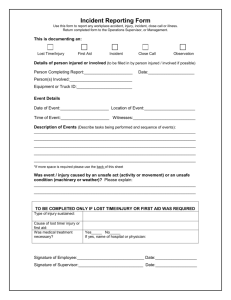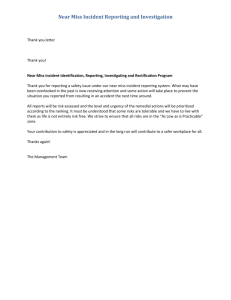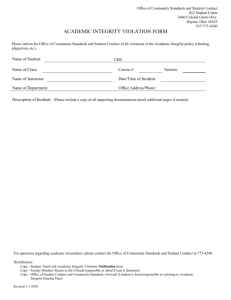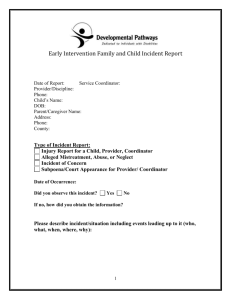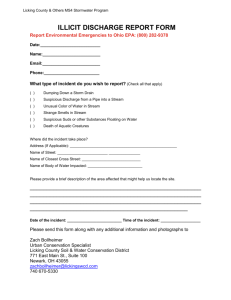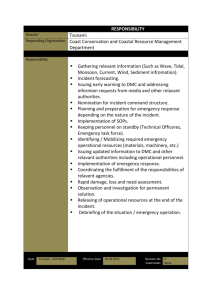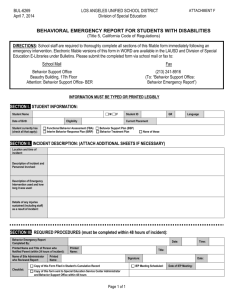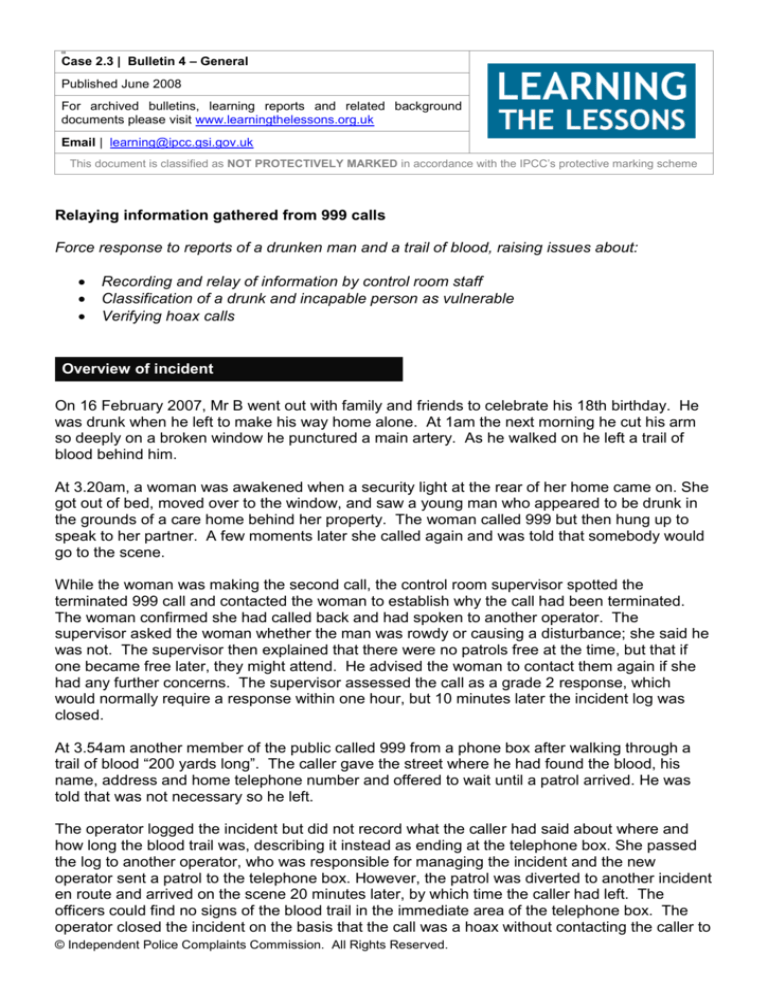
68
Case 2.3 | Bulletin 4 – General
Published June 2008
For archived bulletins, learning reports and related background
documents please visit www.learningthelessons.org.uk
Email | learning@ipcc.gsi.gov.uk
This document is classified as NOT PROTECTIVELY MARKED in accordance with the IPCC‟s protective marking scheme
Relaying information gathered from 999 calls
Force response to reports of a drunken man and a trail of blood, raising issues about:
Recording and relay of information by control room staff
Classification of a drunk and incapable person as vulnerable
Verifying hoax calls
Overview of incident
On 16 February 2007, Mr B went out with family and friends to celebrate his 18th birthday. He
was drunk when he left to make his way home alone. At 1am the next morning he cut his arm
so deeply on a broken window he punctured a main artery. As he walked on he left a trail of
blood behind him.
At 3.20am, a woman was awakened when a security light at the rear of her home came on. She
got out of bed, moved over to the window, and saw a young man who appeared to be drunk in
the grounds of a care home behind her property. The woman called 999 but then hung up to
speak to her partner. A few moments later she called again and was told that somebody would
go to the scene.
While the woman was making the second call, the control room supervisor spotted the
terminated 999 call and contacted the woman to establish why the call had been terminated.
The woman confirmed she had called back and had spoken to another operator. The
supervisor asked the woman whether the man was rowdy or causing a disturbance; she said he
was not. The supervisor then explained that there were no patrols free at the time, but that if
one became free later, they might attend. He advised the woman to contact them again if she
had any further concerns. The supervisor assessed the call as a grade 2 response, which
would normally require a response within one hour, but 10 minutes later the incident log was
closed.
At 3.54am another member of the public called 999 from a phone box after walking through a
trail of blood “200 yards long”. The caller gave the street where he had found the blood, his
name, address and home telephone number and offered to wait until a patrol arrived. He was
told that was not necessary so he left.
The operator logged the incident but did not record what the caller had said about where and
how long the blood trail was, describing it instead as ending at the telephone box. She passed
the log to another operator, who was responsible for managing the incident and the new
operator sent a patrol to the telephone box. However, the patrol was diverted to another incident
en route and arrived on the scene 20 minutes later, by which time the caller had left. The
officers could find no signs of the blood trail in the immediate area of the telephone box. The
operator closed the incident on the basis that the call was a hoax without contacting the caller to
© Independent Police Complaints Commission. All Rights Reserved.
verify the information he had provided before.
At 7.30am Mr B‟s body was discovered in the grounds of the care home.
Type of investigation
IPCC Managed investigation.
Recommendations
1. The accuracy and lack of detail in the incident log was instrumental in the failure to locate
the trail of blood. If the caller had been called back before the incident was closed,
further information could have been acquired and the location of the trail of blood could
have been ascertained. Since the incident the force had introduced the practice of recontacting callers before incidents were closed. The force was also appointing Quality
Control Operators to re-contact callers to establish their satisfaction with the service
provided. Dip-sampling of 999 calls should be introduced to ensure information provided
in the call was transferred to the incident log. Internal communication with staff was
recommended to remind all staff of the importance of accurately recording incidents.
2. The advice of the force solicitor was that the force was under no obligation to provide any
„duty of care‟ towards Mr B as he was drunk and incapable rather than drunk and
disorderly, and there was no indication that his safety was at risk. On this occasion,
accordingly, the decision not to deploy officers to the scene was reasonable. However,
someone incapable of being roused, as well as drunk and incapable, could be
considered vulnerable. The force should review the definition of „vulnerable person‟
contained within its guidance for call handling staff.
Force response
Recommendations made in the course of the investigation had been brought to the attention of
the call handling centre management and incorporated into training for new staff as well as
developmental training for those already in post.
If you need more information about this case, please email learning@ipcc.gsi.gov.uk
© Independent Police Complaints Commission. All Rights Reserved.

